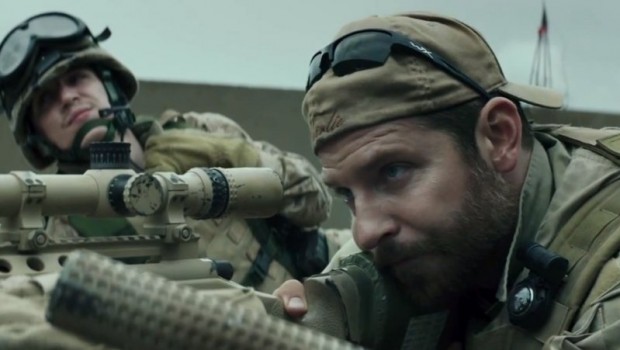American Sniper – Film Review
Reviewed by Damien Straker on January 20th, 2015
Roadshow presents a film by Clint Eastwood
Produced by Clint Eastwood, Robert Lorenz, Andrew Lazar, Bradley Cooper and Peter Morgan
Written by Jason Hall, based on American Sniper by Chris Kyle, Scott McEwen and Jim DeFelice
Starring: Bradley Cooper and Sienna Miller
Cinematography: Tom Stern
Edited by Joel Cox and Gary D. Roach
Running Time: 132 minutes
Rating: MA15+
Release Date: January 22nd, 2015
Untruthfulness tarnishes the qualities of Clint Eastwood’s American Sniper. It’s made with fine technical expertise, expectant of the eighty-four year old filmmaker, and is strongly acted. Yet it’s also an incomplete, dishonest portrait of a trained killer who lacked a conscience. Before his death in 2013, Chris Kyle served four tours of Iraq. He was the most decorated American sniper in history with 160 confirmed kills and nicknamed ‘Legend’. Screenwriter Jason Hall, adapting Kyle’s book, conversed with him until a day before his death. Steven Spielberg was to direct the film, hoping to show a rival sniper, but Eastwood replaced him. Violence is a persistent fascination for Eastwood, one he’s explored his whole career from both sides of the camera.
In his recent work, like Flags of Our Fathers and Gran Torino, Eastwood has shown sympathy for soldiers out of combat while also critical of the sociopolitical forces around them. American Sniper offers far less. It’s not a psychological study but an action movie, accounting for its box office success despite a limited release. The film’s dedication to combat is increasingly boring and paints Kyle’s life as a sentimental, romanticised tragedy. The truth about this man is darker, more disturbing than this misleading psychodrama.
In the film Kyle and his younger brother grow up in Texas. Their father is a religious, dogmatic man, intolerant of bullying or pacifism. He takes Kyle hunting, teaching him to always hold onto his rifle. These family values carry into Kyle’s adult life where he joins the Navy SEALS after seeing footage of the 1998 United States embassy bombings. In magnetic form, Bradley Cooper features as the grown-up Kyle. Like an old fashioned American cowboy, Cooper possesses an effortlessly likable, easy charm. But like films such as Silver Linings Playbook it’s the undercurrent of anger which makes his performance unsettling. Kyle and his wife Taya (Sienna Miller) watch on in horror at a television screen showing the September 11 terrorist attacks. A close-up shot of Kyle’s face provides Cooper time to stimulate the anger rising inside him. As a producer on the film, his only mistake is mimicking Kyle’s thick drawl. At times his dialogue is inaudible.
Cooper brings brittleness and insecurity to Kyle but the emotions from Jason Hall’s pen are fabricated. In the opening sequence, one the film returns to, Kyle sees a woman and child approaching a group of soldiers with an explosive. He is indecisive about pulling the trigger. Likewise, in a later scene Kyle sees a child picking up an anti-tank weapon and dwells over shooting the boy. Both sequences use tight framing via a close-up shot to show the pressure of Kyle’s decision-making. The outcome in one set piece is brutal because Eastwood doesn’t cut from the violence, which enhances its dramatic impact.
Cooper’s performance is fine, as is Eastwood’s creative team, including long time editors Joel Cox and Gary Roach and cinematographer Tom Stern. However, the hidden political agenda in the aforementioned set pieces is undesirable. Kyle’s tense decision-making is wish fulfillment, a fantasy where soldiers retain moral consciousness about who they kill. The goal is to use Kyle to revive the “a man’s gotta do” attitude, transforming him into a softer variation of the Dirty Harry archetype. The film argues he loves his job out of duty not sadistic pleasure – a contrast in psychology the film dishonestly sidesteps. Chris Kyle was not Dirty Harry, John Wayne or Cooper’s fragile soldier. Writer Laura Miller read Kyle’s memoir and on the website Salon.com in 2013 she wrote that Kyle described killing as fun and something he loved. During an interview on The O’Reilly Factor in 2012, Bill O’Reilly asked Kyle if he realised he liked killing insurgents and he replied: “It’s not a problem taking out someone who wants your people dead. That’s not a problem at all”.
This sadism (or madness) isn’t disclosed in the film’s domestic scenes, which falsely argue he was driven by patriotism and protecting America alone. These sequences prolong a repetitive argument, failing to penetrate Kyle’s robotic ‘can-do’ shell while neglecting his wife’s pleas to stay home. Sienna Miller is solid, ensuring lines like “I see you, I feel you, but you’re not here” are highly emotive but Taya is a one-note character devoid of onscreen friends or family. Evidently, Eastwood and Hall have deceptively manipulated Kyle’s image, making him more sympathetic and a universal avatar, applicable to American soldiers involved with the War on Terror. The backflip in political rhetoric is startling given two of Eastwood’s best films Unforgiven and Mystic River deconstructed the myth of righteous violence.
American Sniper’s exploration of post-traumatic stress disorder is compromised in similar ways to Kathryn Bigelow’s The Hurt Locker. PTSD is represented through audio-vision. Everyday sounds and images, including a drill, cars and a dog at a birthday party, remind Kyle of his combat experiences. These are intensely effective at times but hardly unique representations and like Bigelow’s film don’t convey the full extent of the violence affecting sufferers. Highlighting these limitations is the terribly abrupt ending. By not dramatising Kyle’s death, the most serious and damaging effects of PTSD are forgone and dwelling over his anger builds to naught. Like The Hurt Locker, American Sniper prefers the shape of an action movie. Initially, the sequences are excitingly staged and extremely involving. The failure of some missions, including one where Kyle must protect an Iraqi informant, adds to their power. But from the start of the third tour I was battle weary and bored by number four.
Since when is Eastwood more interested in choreographing action than the story and relationships? There are shootouts, heroics, rivalries against enemy snipers, all geared towards making us mourn Kyle like the people in the footage over the end credits. Many Americans who have recently seen the film and made it an enormous box office hit will argue Kyle’s a hero. But his legacy wasn’t kindness, decency or social reform. It was murdering people for a living, a cold talent he loved. The film reshapes his merciless attitude into a patriotic icon when America’s gun violence, particularly from law enforcers, is demolishing lives. Death clouds people’s judgements. The flaws of those who died fade into the passages of time, like they never existed, replaced by idealised memories of their apparent qualities. American Sniper is like that: it’s not a biopic but a polite, deceitful eulogy of a far more complicated man.
Summary: It's not a biopic but a polite, deceitful eulogy of a far more complicated man.








